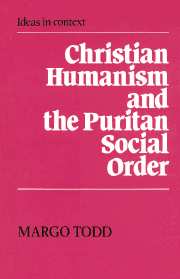Book contents
- Frontmatter
- Contents
- preface
- Abbreviations
- 1 Introduction: The demythologizing of puritanism
- 2 Christian humanism as social ideology
- 3 The transmission of Christian humanist ideas
- 4 The spiritualized household
- 5 Work, wealth and welfare
- 6 Conscience and the Great Chain of Being
- 7 The conservative reaction: Trent, Lambeth and the demise of the humanist consensus
- Bibliography
- Index
4 - The spiritualized household
Published online by Cambridge University Press: 06 July 2010
- Frontmatter
- Contents
- preface
- Abbreviations
- 1 Introduction: The demythologizing of puritanism
- 2 Christian humanism as social ideology
- 3 The transmission of Christian humanist ideas
- 4 The spiritualized household
- 5 Work, wealth and welfare
- 6 Conscience and the Great Chain of Being
- 7 The conservative reaction: Trent, Lambeth and the demise of the humanist consensus
- Bibliography
- Index
Summary
Among the innovative social ideas with which puritans have been credited is the doctrine of the family, rather than the parish, as the fundamental spiritual unit of society. To protestantism, and particularly to protestantism of the hotter sort, are attributed the exaltation of marriage over virginity, the requirement for parents to occupy a religiously didactic and disciplinary role, and a slight tendency toward sexual egalitarianism in light of the spiritual role of women within the household. We are told, for example, that ‘the Reformation, by reducing the authority of the priest in society, simultaneously elevated the authority of lay heads of households,’ and that the stress on household religious instruction and discipline ‘was part of the protestant inheritance.’ We are told that since the Reformation, the family has become the basic and most essential unit of church government, and that the head of the protestant, and especially of the puritan household is expected to oversee the spiritual welfare of his family and to conduct daily worship in the home. Furthermore, it is asserted that ‘until Puritan ideals came to have some influence, the average characterization represented women as at best a “necessary evil” for the propagation of the race’ and that it was puritanism which heralded the shift from the patriarchal to the conjugal family. Both Catholics and conforming Anglicans can be found who minimized the religious responsibilities of householders – ergo, the spiritualization of the household was a puritan accomplishment.
- Type
- Chapter
- Information
- Christian Humanism and the Puritan Social Order , pp. 96 - 117Publisher: Cambridge University PressPrint publication year: 1988

